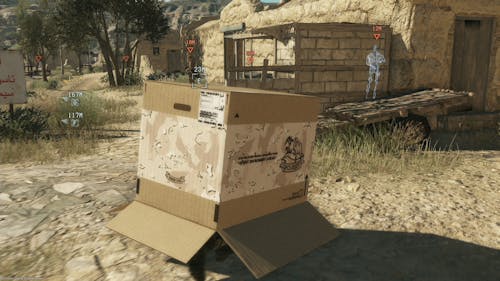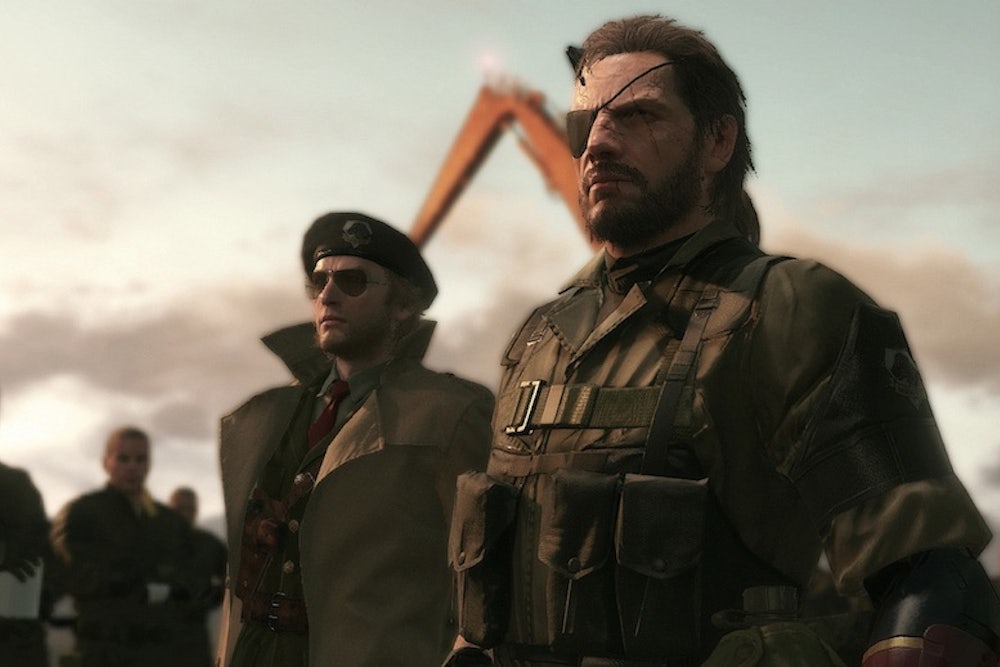At this point in history, no author is more divisive than Jonathan Franzen. Even people who like his books have to admit that they’re kind of terrible. In Grantland, Brian Phillips wrote: “Probably no one alive is a better novelist than Jonathan Franzen, and this is frustrating because his novels are awful, excellent but awful, books you read quickly and remember ponderously, books of exhaustive craft and yet a weird, spiraling cluelessness about the data they exhaustively collate.” Which is to say that Franzen writes great books entirely in spite of himself.

If video games have an equivalent, it is Hideo Kojima, the brilliant and exhausting Japanese game designer who makes some of the most interesting big budget action games. His work subverts the genre in ways that are both intelligent and maddening: Kojima's most famous series, Metal Gear, has been satisfying, sprawling, and convoluted since it began in 1987. Nearly 30 years later, the (supposedly) final installment, Metal Gear Solid V: The Phantom Pain, is Kojima’s crowning achievement. Released in early September, the game cost over $80 million to produce and sold 3 million copies within the first five days. I have played dozens of hours of it since launch day. And I can say that for all of its genius, The Phantom Pain is so excellent and so awful.
The Metal Gear games take place in an alternate timeline where the world is governed by technology and paramilitary warfare. All of its characters are tragic figures shellshocked from the unending horrors of battle; as a title, The Phantom Pain refers to the sensation of pain in a lost limb. The game takes place in the ’80s, where the player assumes the role of Punished “Venom” Snake, the vengeful leader of a private army that houses itself on a bright orange platform in the middle of the ocean. You take on a series of contract missions—rescues, assassinations, espionage—across beautiful open-world renderings of Afghanistan’s deserts and the jungles of the Angola-Zaire border in pursuit of a mysterious villain named Skull Face, later connected to a global conspiracy that links the story of The Phantom Pain to other Metal Gear games.
On the surface, The Phantom Pain plays like any other popular militaristic shooter. Triple-A titles, particularly American-made ones, position themselves as broadly as possible, rife with blandly uncomplicated scenarios where the player fights some vague threat. None of the Metal Gear games do this. If nothing else, Hideo Kojima is interested in making games that are unabashedly weird and oddly specific.
For an example, look no further than The Phantom Pain: The game is bizarrely nostalgic. Snake carries a Walkman at all times; cassette tapes with staple ’80s songs like Hall and Oates's "Maneater" or A-ha's "Take On Me" can be collected throughout the game, and you can listen to them if you’d like. Snake's army is dubbed the Diamond Dogs; neither their obsession with diamonds nor the throwaway reference to the David Bowie album are ever explained. As the title suggests, The Phantom Pain continues the Kojima's strange fascination with bodily dismemberment. That's not to say any of this makes The Phantom Pain better. But it certainly makes it memorable.
It’s better when Kojima’s weirdness takes the form of actual gameplay mechanics. The game’s most interesting feature allows you to send unconscious soldiers you’ve subdued back to your secret base to join your army. This is easily The Phantom Pain’s most satisfying element, as the act of collecting soldiers turns the game into a bizarro, paramilitary Pokémon.
Jonathan Franzen has likely never played a Metal Gear game, but his inexperience with technology has never stopped him from expressing strong opinions about it. This is perhaps what frustrates people the most about Franzen, especially when this kind of baseless moralizing enters the realm of his fiction.
If Franzen writes big, riveting novels full of sophomoric ideas, Hideo Kojima makes the same sort of video game. Kojima’s outlandish techno-universe may be a far cry from Franzen’s domestic realism, but he has a similar knack for political grandstanding. Kojima’s preoccupation with Western hegemony and post-Cold War paranoia is the foundation of the Metal Gear series. The Phantom Pain in particular features missives about child soldiers, the threat of nuclear arms, and the colonialism of language. Kojima is better at evoking these themes emotionally—in particular, through the homoerotic bond between Snake and his sub-commander, Kazuhira Miller. But in every other regard, Kojima’s cynical worldview feels juvenile and heavy handed. Which is probably fitting, since Snake’s left hand is literally a heavy robotic prosthetic.

Franzen’s novels and Kojima’s games are similarly constructed. Franzen has referred to his first two books, The Twenty-Seventh City and Strong Motion, as “systems novels,” a decidedly unromantic designation wherein the characters exist to serve the ideas of the narrative. In his later novels, on the other hand, Franzen has said that “the systems are there to serve the characters,” specifically referring to The Corrections, Freedom, and likely Purity. Video games are designed as a series of systems that serve the characters—namely the player. For a game like The Phantom Pain, success hinges on just how seamless those systems are, and how invisible they are to the player.
The seams are pretty obvious because Kojima is stitching together so many disparate elements; the word “overstuffed” comes to mind. (Not coincidentally, it’s a word that showed up repeatedly in reviews of Purity.) Between the shooting and the sneaking, the base management and resource allocation, the game reveals itself as a complicated series of interlocking systems. This works most of the time. The desert and jungle landscapes are brought to life with weather systems and active wildlife; enemy bases operate intelligently, with soldiers and trucks organizing in convincing patterns. A system of weapon and infrastructure development is powered by the player’s ability to effectively manage resources, allowing them to invest in new guns and tools that match individual play styles.
But in many specific moments, The Phantom Pain feels like a fruitless exercise in game design maximalism. One of the game’s most important moments—an outbreak at your offshore base—involves scrolling through a list of hundreds of members of personnel and filing them into quarantine, which might be fun if you were expecting Metal Gear to be a human resources simulator from hell.
That might actually be consistent with Kojima’s cynical worldview. Several months ahead of The Phantom Pain's release, Konami, the Japanese developer that published the Metal Gear games, announced it was parting ways with Kojima. Some suspect Konami’s mobile-focused business incentives no longer aligned with Kojima’s. Other rumors cited concerns over the company's management style, which apparently resembled the Stanford prison experiment.
That split between has been unpleasant. Video game publications immediately noticed that Konami had begun scrubbing Kojima's name from all of The Phantom Pain’s promotional materials. Not to be outdone, Hideo Kojima inserted his name as many places as possible in the game itself. The credit line "A Hideo Kojima Game" appears when you begin any of the game's fifty story missions, again once you complete them, and in numerous other instances throughout—a move so brash that it has spawned a number of internet memes. It’s as funny and annoying as Franzen’s chilling-on-the-beach author photo.
Maybe this is the true genius of Hideo Kojima. He is an auteur of blockbuster videogames, self-serious and questionably self-aware. Though the Metal Gear games are as excellent as they are awful, you can see Hideo Kojima's fingerprints over all of them. And if you can't see them, he will graciously remind you by showing you his name, over and over again.
An earlier version of this article stated that Hideo Kojima's management style was draconian, when that is in fact unclear; it has been updated to reflect the change.
